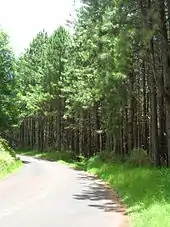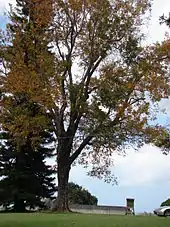Piiholo
Piʻiholo is a mountain summit on the island of Maui in Hawaii. It is at 20°51′7″N 156°17′33″W and has an elevation of 689 meters (2,260 feet).[1]

Its soils are mostly dark reddish brown silty clays developed on long-weathered volcanic ash which supports ranchland where cattle and horses are raised.[2] There also is a headquarters unit of the Maui Invasive Species Committee (MISC)[3] at the Haleakala Experiment Station of the University of Hawaii.[4] The nearest town is Makawao.
The major landowner in the area is the family descended from Henry Perrine Baldwin (1842–1911).[5] His son Henry Alexander Baldwin created the Piʻiholo Ranch out of the larger Haleakala Ranch, named after Haleakalā, the highest point in Maui. The ranch now features eco-tourism.[6] The endangered Hawaiian goose Branta sandvicensis known as Nēnē in the Hawaiian language, is being reintroduced here under supervision of Peter Baldwin.[7][8]
References
- U.S. Geological Survey Geographic Names Information System: Piiholo
- "Web Soil Survey".
- "Maui Invasive Species Committee (MISC)". web site. Hawaii Invasive Species Council. Archived from the original on 2012-01-09. Retrieved 2010-01-13.
- "Haleakala Experiment Station, Maui County". web site. University of Hawai‘i - College of Tropical Agriculture and Human Resources. Retrieved 2010-01-13.
- "History: 7 Generations - a paniolo legacy". web site. Piʻiholo Ranch. Archived from the original on 2015-02-23. Retrieved 2010-01-13.
- "Hawaii's Newest and Longest Side-by-Side Zipline Launches Operation in Upcountry Maui". web site. Piʻiholo Ranch. February 16, 2009. Retrieved 2010-01-13.
- "Safe Harbor Agreement for the introduction of the nene to Piiholo Ranch, Maui" (PDF). State of Hawaii, Department of Land and Natural Resources. August 2004. Archived from the original (PDF) on 2011-03-22. Retrieved 2010-01-13.
- Bill Standley (August 2004). "Ranchers Advance Recovery of Rare Hawaiian Bird". web site. Environmental Defense Fund. Archived from the original on 2011-01-24. Retrieved 2010-01-13.
